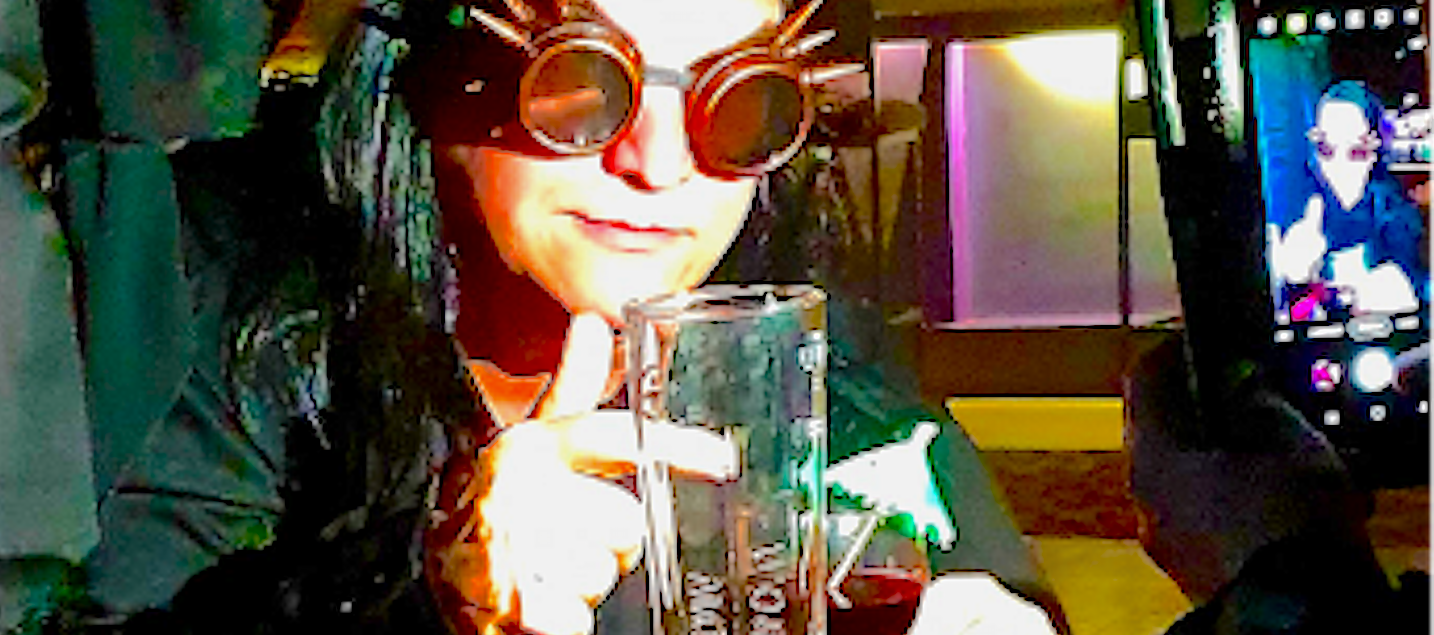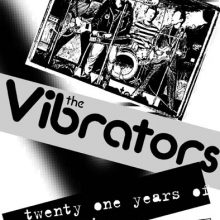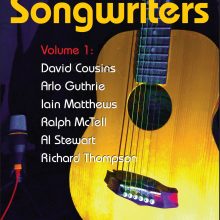“We’re bringing goth music and festivals back to Morecambe”
FIONA and ALEX WETTON of Alhambra Live and Corrosion talk to Nick Awde
Alhambra Live Magazine #009
Support independent writing, buy me a coffee at buymeacoffee.com/nickawde
— Fiona & Alex were interviewed at Alhambra Live’s goth festival Bats in the Attic 2022.
—Alhambra Live’s next goth festival is Bats in the Attic, September 8-9
ALHAMBRA LIVE is one of the biggest grassroots music venues in the North West. Based in Morecambe on the sea Promenade, its adaptable spaces (and unique Lake District views) make it a vibrant hub for all-dayers and weekend festivals (Goth, Mod, Ska, Northern Soul…). It is also a home and hub for gothic music with Corrosion club night and the CorrosionFest & Bats in the Attic festivals. For more info, contact Fiona +44 (0)7771 200 873 / fiona@alhambralive.com
Alex Wetton: That’s what we’re setting out to change. But we need to remember that it was very different 20 years ago.
Fiona Wetton: That was when Morecambe Goth Weekend was bigger than Whitby. But like all the other festivals that have disappeared from the town, they hit a problem with the council, funding was withdrawn at the last minute and that was the end of Morecambe Goth Weekend.
Nick: A sadly familiar story that’s part of the saga of all those Lost Festivals of Morecambe which would have helped keep the town afloat through its decades of decay.
Alex: When we first moved here there were a lot of festivals. Rebellion, the punk festival was here and it was big – it was already linked to Morecambe as Holidays In The Sun and Wasted – and there was also a big rock festival. The Festival Market was still being used – it’s not been used for festivals for a long time now, although the whole point of the market is that you can clear away all the stalls quickly so the place can be used for events.
Fiona: There was a 40s weekend. It didn’t last long but it was huge, they even had invasions on the beach with explosions – and there’s a new one slowly coming back. So Morecambe used to be a big festival place, which is so easy to do because it’s designed to be a festival place. It had so much going on and then it all dwindled away.
Alex: Rebellion left, again there was a problem with the council. The festival had been alternating very successfully with Blackpool, and one year they stayed over there and didn’t come back. There was a rock festival with all the bikers, they went. The mods disappeared out of town – Morecambe used to be one of the national rallies, held at the Midland Hotel. I don’t know if it’s because the Midland shut down or for other reasons but they moved to the Ranch House in what was left of Frontierland, but then they left. Another problem with the council, they say. I went to the final rally and met friends who had come all the way from Faslane in Scotland. All a long while ago now.
Fiona: But the mods are coming back – Morecambe Rides Again, we’ve just had it [July 2022] at the Alhambra. We had 600 in, and they were billing it as “the North West’s only seaside rally”.
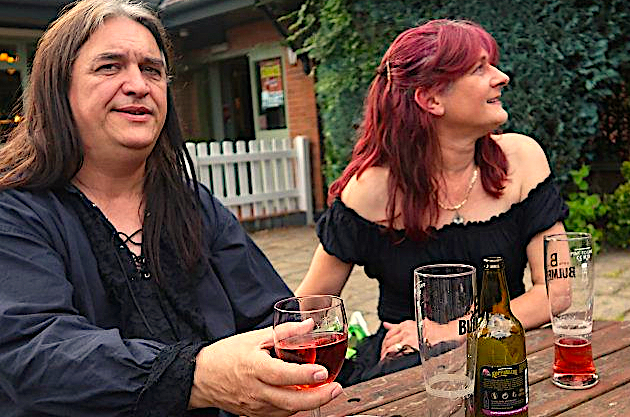
Nick: So even before getting to the goths, this is really about Morecambe still by design being festival-friendly – the festivals you don’t do in a field.
Fiona: It definitely works for the medium-size festival, and Morecambe Rides Again is a good example – the scooter rally was spread over three small to medium-sized venues in the West End of Morecambe: the Exchange pub, the Boardwalk pub and Alhambra Live. They’re safe spaces and all walkable because they’re very close to each other. So it worked over three days over three different size venues.
Alex: You can have your main attraction in the main venue Alhambra Live with 800 capacity, while at the same time the fringe acts go on at the Exchange with something like 200 capacity and at the Boardwalk with something like 100. So there’s plenty of scope for variety. And a flexible venue like the Platform up the Promenade has been perfect to expand the sort of festivals like A Splendid Day Out, the steampunk festival where they turned it over into a big market of stalls.
Fiona: Morecambe Rides Again is also a good example of a festival where people come to the Alhambra from all over the country. But in Morecambe itself, it’s hard to get local audiences to come. No one here’s surprised – there’s the no-man’s land of Frontierland, a derelict site that’s a barrier between the West End and the other side of town. And obviously the West End itself a long while ago was given a bad reputation because it was one of the most held-back and deprived neighbourhoods in the country, but there’s so many people here working to make it a real cultural hub that it doesn’t deserve that reputation any more.
Nick: It doesn’t at all, quite the opposite in fact. For the people who come from out of town, they can see beyond all that. In fact nowadays it’s tempting to compare the West End with Whitby, for the music offer at the moment. I mean, the Pavilion in Whitby is big but they rarely fill it to capacity, so all the people that go there would definitely fit the Alhambra. And Morecambe may not be as villagey as Whitby but it does have its own seaside charm.
Fiona: And we’ve got better views.
Alex: Definitely better. When you look at across the sea at Whitby, it’s just sea. But in Morecambe, you see mountains on the other side.
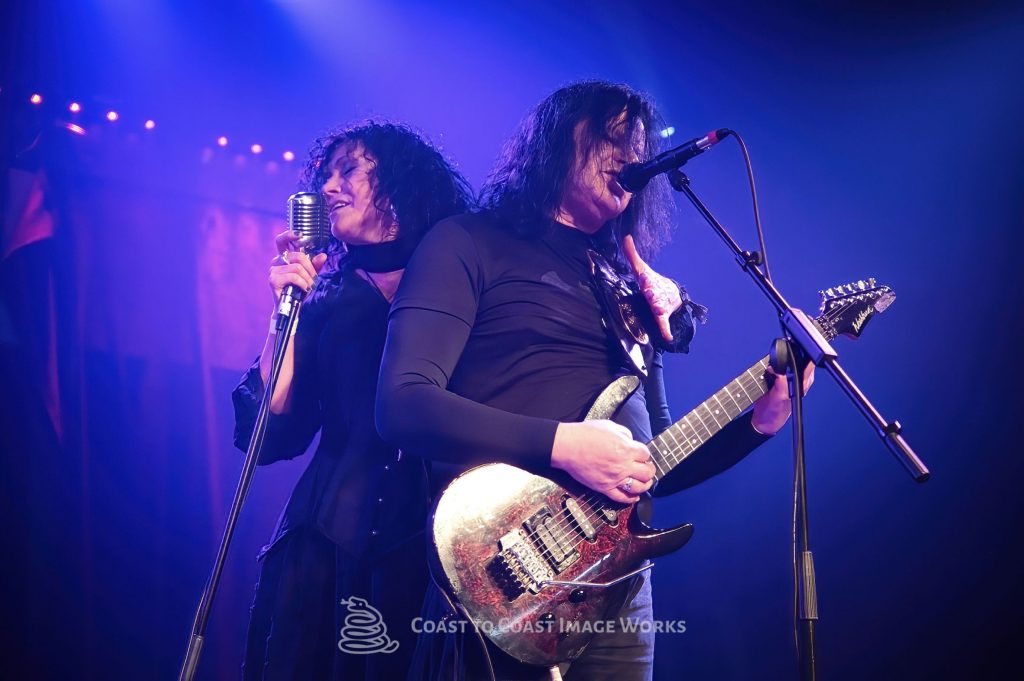
Nick: But we’re not actually here to be rivals.
Alex: No. Whitby’s a brilliant place to go to. Even if there’s nothing on, it’s a really nice seaside town.
Nick: And we have to admit it’s a prime place to be seen promenading out in the streets.
Fiona & Alex: The Day Walkers…
Fiona: If we want to dress up, we go to Whitby. It’s got both sides: dress up in the day—
Alex: —and at night it’s music.
Nick: So the Morecambe offer is always the music – serious about the music. And the Alhambra is the perfect hub for that. You spent a couple of years creating a top-level venue and launched it as fully ready for business with CorrosionFest 2020… and then all the venues across the country closed down the Monday after.
Alex: Everything locked down. They made the announcement about non-essential businesses on the Friday. So everyone went to the pub for a last drink, didn’t they? [laughs] We had that first festival after Donna McLeod and Mike Murray of McGothicfox Promotions twisted our arms to do it. We were happy doing our normal Corrosion club nights and we got good audiences. So we thought it was worth taking the risk to put on live music. We ended up doing CorrosionFest in March 2020, and the unfortunate coincidence of Lockdown meant that we were the only major goth event that year, so everyone was talking about us.
Fiona: We had already put on a sit-down live event with Auger, Novus and Nightmare Engine when we were allowed to in June 2021, in between Lockdowns. There was the Waterloo in Blackpool a couple of weeks before us – they also had Auger on and that was reassuring because we went to the night and had a really good time even though we had to sit down. We had worried Corrosion was going to be terrible because it was sit-down, but like the Waterloo, it was good. We were practically the first festival after Lockdown with the second CorrosionFest in March this year [2022], in between two Whitbys.
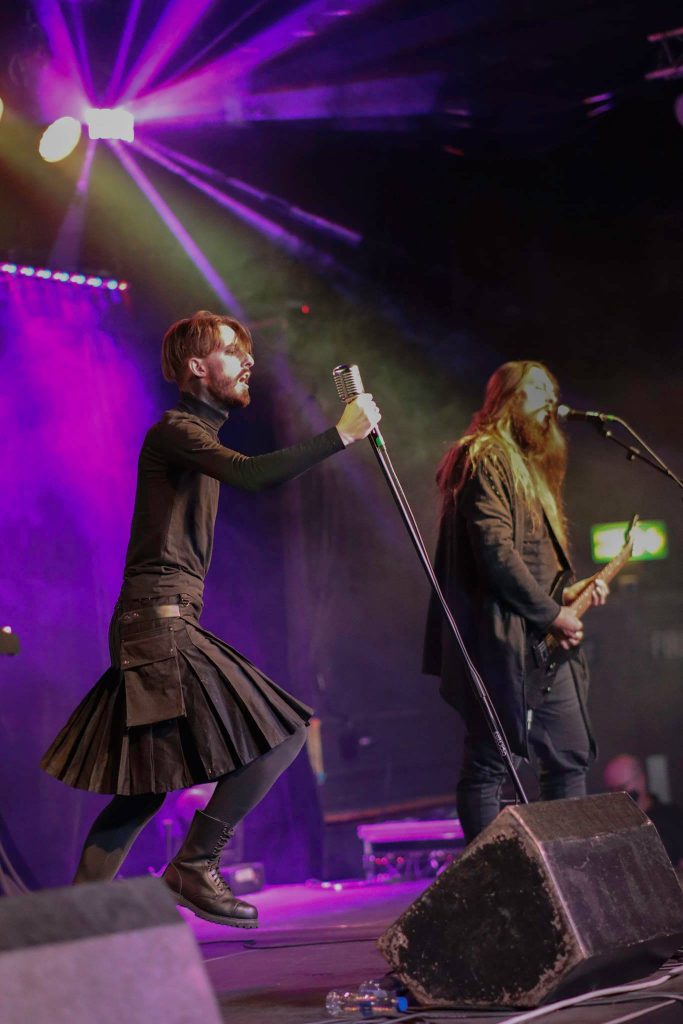
Nick: It was good that CorrosionFest this March happened and that people turned up, because that might so easily not have happened because of Covid. In fact, here we are in the summer of 2022 and Covid uncertainty is still affecting live music, especially grassroots live music.
Alex: It was a big worry. One of the things I remember for CorrosionFest 22 was band cancellations. We went through so many changes running up to the final event, I lost track of how many bands we went through before we ended up with the final line-up. And we even lost three bands just before it started. Klammer and Rhombus because of Covid – Klammer on the Friday before the Saturday they were to play – and one through a broken finger… unfortunately the drummer of This Can Hurt found out that this did hurt. Luckily Gothzilla and West Wickhams stepped in and did two of the slots. We only managed to replace two of the three bands at such short notice so we extended stage times. In fact, 2022 has been the year of cancelled bands, even up to now.
Nick: A broken finger is a broken finger in a normal year, but 2022 isn’t normal, so clearly the smallest blip can tip the balance.
Fiona: Something like that can throw the whole event. It’s not helped by the fact that audiences everywhere are booking last minute now, which is not good. When you’re paying bands, you need to know how many people are coming, so you know whether you can afford the bands or not.
Nick: And you need to double factor in everything because you also have your second festival this year, Bats In The Attic.
Alex: Which is more leaning towards traditional goth, whereas CorrosionFest is leaning towards the different branches of goth, as well as a bit of punk because that’s where goth came from. We wanted Chaos 8 to open the last CorrosionFest but they had to cancel because of migration – the bass player had emigrated and he wasn’t allowed to leave the country he had gone to for something like three months.
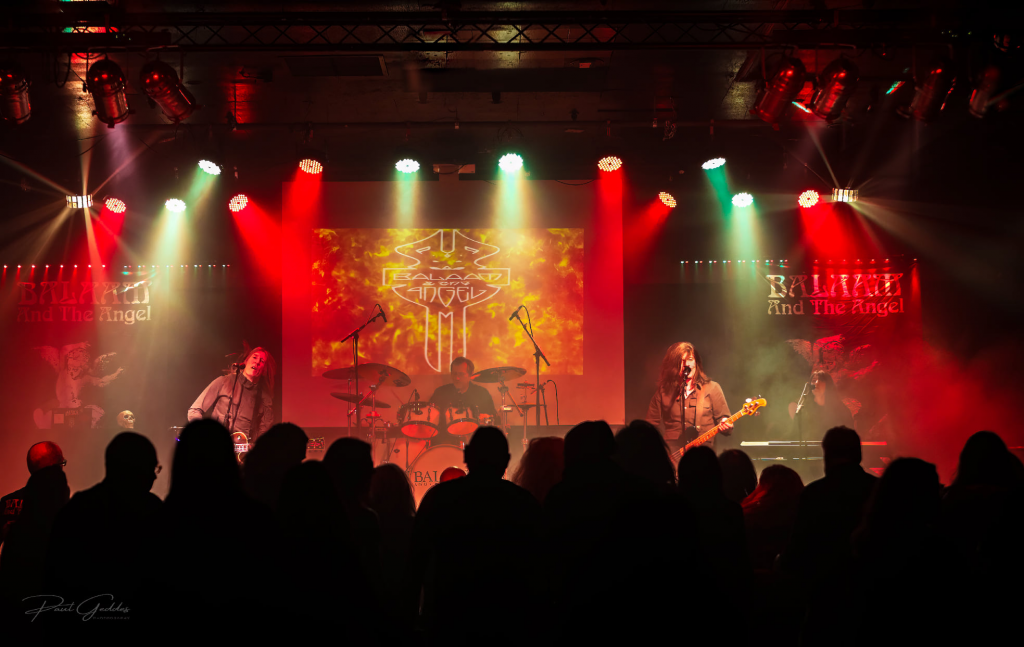
Nick: It’s interesting to see how the two festivals are taking shape under the umbrella of Corrosion’s ‘West Coast Gothic’ concept.
Alex: It could be seen as starting all over again, because Bats In The Attic is a different name and people might not link it to CorrosionFest. We could have keep just the one name, but then how would you differentiate? How would you let people know that the August one’s more traditionally goth whereas the March one’s more a mix of all the goth genres.
Nick: We can see that as a nicely positive problem because it’s all about people converging on Morecambe for the music – and of course those views of the Lake District that you’ve already noted.
Alex: And Morecambe’s got a beach that’s not too bad as well. Elkapath were very impressed with our beach and they’re from Bristol, which must have a beach of its own.
Fiona: I think it’s true that when the bands and audiences come to Corrosion or Bats In The Attic they feel safe. We’re all the same and it doesn’t matter what you look like or dress like – it’s a safe space. You’re safe to dress up in your finest goth clothes if you want, but if you just want to come in jeans and t-shirt no one cares. Wear what you like, you’re here to enjoy the music. That’s all that’s required.
Alex: When we first started, we didn’t want any politics. Because you see it around the scene where people go, “Oh you are not punk enough. You can’t come in.” Or, “You’ve got the wrong colour socks for us teddy boys. So you can’t come in.” We didn’t want none of that.
Nick: How do you work at guaranteeing that diversity to give people the freedom to trust the programming and not have to worry whether there’s not enough dark wave or electronic or whatever.
Fiona: It’s a group decision. We look a lot of different bands and we have quite different tastes to Donna and Mike.
Alex: So whereas Donna and Mike are quite traditional, we like the bleepy stuff, [laughs] as Mike calls it. But we do like the traditional stuff as well. Mike’s not happy unless there’s guitars in it. I like guitar rock-type stuff but I’m also happy with the synth stuff as well.
Fiona: So the four of us have very different tastes in the music. And then there’s John Gothelder and Carole Bennett, who are in the area, and we get them into the discussions as well. So we’ve all got different tastes, we all try to pick something that we all like – this time we each had a guarantee of one band that each wanted to see on the bill – and then the rest is a group decision which suits the event best.
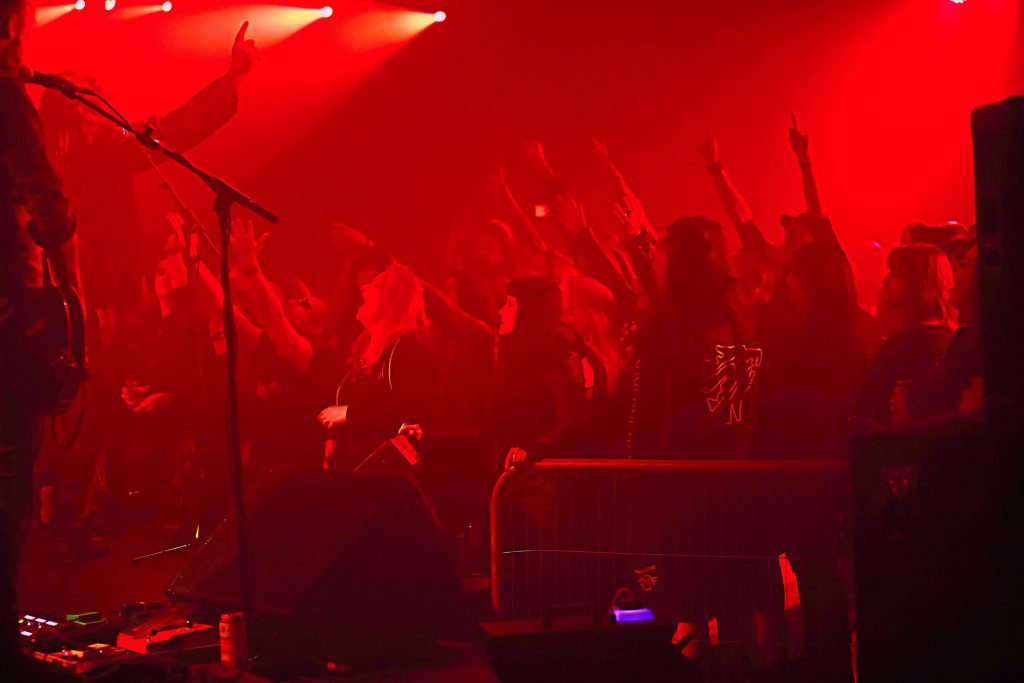
Nick: How do you get a good range that’s, let’s say, forward-looking? Aside from the genres, a growing concern is the age thing, isn’t it?
Alex: It is, and we’re always aware of it. Goth has been going for years obviously, and while some of us have been around for a long time, goth is bringing in new people with the newer waves of things like dark wave and industrial, especially the German stuff. So we’re always getting new people interested and that’s one of the reasons we like to start our festivals with upcoming and not-so-well-known bands to get them in the public eye, to bring in a younger crowd that follow them. And that’s how we all keep the goth scene going, you’ve got to bring in new blood.
Fiona: It’s also quite good when we have the the DJ at the end of the Corrosion club nights where he does requests.
Alex: I do. [Alex is also DJ Alex The Gothmariner]
Fiona: Because the people request stuff that we’ve maybe not heard of. It gets airplay so then we can all hear it and then we’ll go away and listen to the album or whatever.
Alex: If I’ve not got what they request, I’ll mark it on my bit of paper, look it up after, and see if I can get it.
Nick: How do Corrosion Fest and Bats In The Attic complement the monthly Corrosion nights?
Alex: The Corrosion nights are traditionally just DJ’ed. We toyed with having bands and did it, but it’s proved too costly because of the smaller crowds. The idea is for all the money that we make from the club nights goes into paying for the festivals. So money’s a bit tighter this year because a lot of bands got paid. [laughs] So at the moment we’re going back to just the club nights – and we’ve had quite a few people saying they prefer the club nights without live bands anyway, so hopefully we’ll have more money for CorrosionFest 2023. Which is how a little club night became a runaway train and ended up a festival.
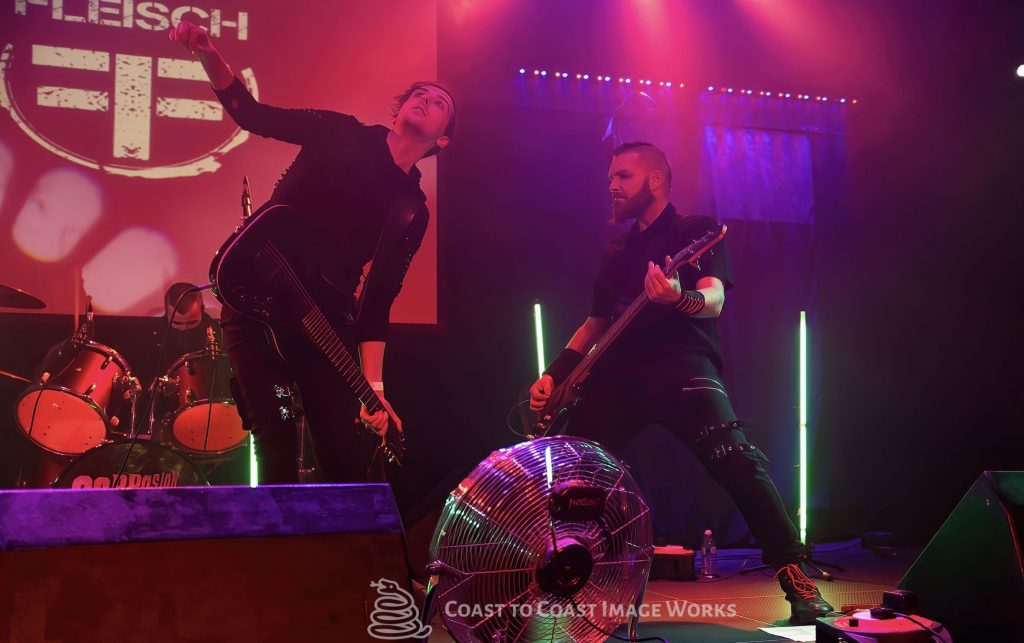
Nick: It’s a strange puzzle of that gothic division between live music and club nights.
Fiona: It’s very hit and miss, and I think it’s a lot to do with Covid. There’s still the situation of people wanting to come out but they won’t buy tickets in advance because events could get pulled. So everyone’s buying last minute now, and it’s not just for goth events, it’s everything. Except of course for the big tours and festivals – like Glastonbury and Coldplay – where people are still going to in huge numbers. A lot of that is tickets from the year they were cancelled, but a lot of that isn’t.
Alex: It does seem this year that people are going to the bigger festivals and not so much to the smaller ones.
Nick: Because, as we know, they’re not risking it and if they’re going to spend their money, they’re going for a guaranteed hit. As I’ve mentioned in other interviews here, the Simply Reds and the Glastonburys of this world are doing bigger and better than they’ve ever done, which was already pretty big. It’s quite a gulf we’re observing.
Alex: The amount of money they make, everybody in every county could put a goth festival on and still have money left over.
Nick: It seems that we’re passing a corner of sorts as confidence is returning, so maybe grassroots venues and festivals can start to plan 2023 with a lot more certainty than this year or last year. And finally start to pick up where 2019/2020 left off.
Alex: In some ways I’m not so worried about Covid anymore. The main worry has become cost of living and have people got the money to go out? With the way the country’s being run at the moment, as well as the rest of the world with cost of living everywhere going up, the question is how long until we reach a point where no can afford to go out. But we’ve just got to stick at it. At first I thought it would take a two-year period to get over the damage Covid has done and overcome the fear of going out. But now that we’ve got the added worry of finance, I just don’t know. People usually will find a bit of money for something, but I don’t know how skint we have to be before we physically stop going out. We are reasonable price, but can we compete with the big gigs and festivals that are really expensive but they’ve got the big names?
Fiona: I think we can, because if it gets too expensive to go to those multimillion pound events, people will still want go out. Even to go Whitby, that’s become so expensive and it’s not the events being expensive, it’s the cost of accommodation. This has nothing to do with the festival organisers, a lot of it’s coming from the B&Bs, hotels and cottages in the area. It’s all become so expensive that a lot of people are now going to Germany because it’s actually cheaper to go to a big festival in Germany than it is to go to Whitby. And if you go to Germany, you’re seeing the biggest bands.
Alex: They’ve always got the likes of Blutengel and Mono Inc., all those big bands. V2A are over there. They’ve just broken the German market and they’re loving it because the crowds are huge. Over here they’re possibly limited to a maximum of 700-800, whereas they go to Germany and they’re in front of thousands, when they go to Wasteland in America they’re in front of thousands. We’ve somehow lost that momentum. It’s a combination of factors of course – in Germany, it was the industrial side of goth that took them to the next level, while in the UK things have become too expensive for various reasons.
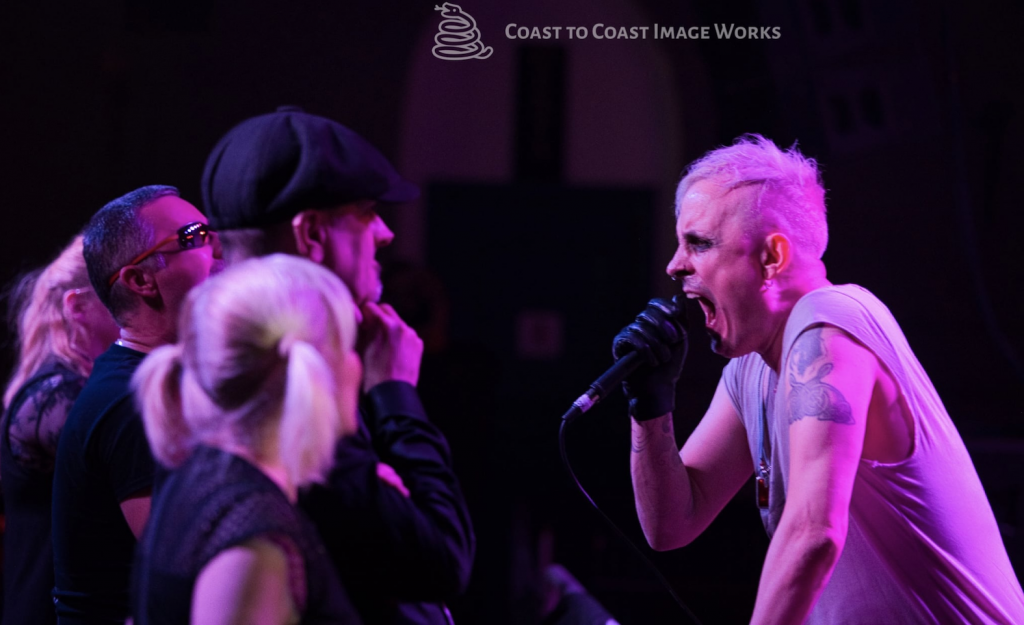
Nick: Morecambe is very much a blank slate waiting to be filled in at the moment. It’s a blank slate because everything disappeared after Morecambe almost overnight turned into the Forgotten Resort, but everyone who comes to the town instantly recognises that there is a solid infrastructure that never went away. Today, it can be whatever you want it to be. It’s really easy to get to, as well – even for people coming from Europe.
Fiona: It can be easy for a lot of people from Europe. You get off the plane at Manchester airport, it’s a few minutes walk to the train station, get on the train to Lancaster, swap to the Morecambe train which is ten minutes from Lancaster. You’re there, right in the centre of town. You just turn left and there’s the West End and the Alhambra, a ten minute walk.
Nick: So what we really need to be doing is to start working on our national ability to generate great bands, which seems to be undergoing a bit of a crisis nowadays.
Alex: There’s some great bands out there, they’re just not getting the breaks that they deserve.
Fiona: Brexit has had an effect on who comes over to play, but at the same time it hasn’t stopped us putting on bands from overseas. There’s no reason why we can’t bring more over, but would Germans really want to come and see a big German band in Britain when they can see them on their doorstep? To attract the German audience over, we need some decent British bands to get noticed. Like Auger got noticed by Germany so they now go across there, so Germans don’t have to come here to see them.
Alex: One of the overseas bands that we’d like to play CorrosionFest is Ludovico Technique and they’re American. For this year, we’ve got Last Dusk from Costa Rica, who will only be playing Bats In The Attic. That’s an attraction for people in Europe, if we can get the word out that we’ve got bands from places like Costa Rica.
Fiona: If we could attract some of the American bands that might want to come over here and people can travel to the UK to catch them while they’re warming up for a tour. That might be another way of getting the Continental audience, to see someone they’re not going to see in Germany on a regular basis. After all, I would fly to Germany to festivals like Amphi Festival or M’era Luna to watch Blutengel, because they don’t tend to play anywhere else.
Alex: And Rammstein.
Fiona: And Rammstein. But Rammstein play the UK, and bands like Mono Inc. and Wisborg have played here quite a few times. So there is a lot of potential for connecting with the international circuits.
Nick: Timing international bands for gigs looks simple, on the other hand fitting them into festivals could be tricky if you’re up against the likes of Glastonbury.
Fiona: Obviously not up against Glastonbury because that’s a totally different audience! But we have been up against HRH Goth, for example. We announced our very first CorrosionFest date which were out there for months. Then HRH Goth popped up on the scene with the same date and we thought well they’ve got all the money and the big names, we can’t compete with that. So we moved it to March, which has proved a good choice, because we’re the first biggish goth festival of the year, it’s out of season – in a good way, we’re before Whitby and everything else. But it’s getting harder and harder to to find these dates now.
Alex: After Covid, everyone and their dog’s putting something on. It’s, “Oh, I’ve been away for so long, let’s try it again.”
Fiona: We’ve clashed with quite a few events recently – Bats In The Attic clashes with Bloodstock which has a crossover with us so we know we are losing some audience who are going Bloodstock because they always go to Bloodstock!
Alex: Luckily we don’t clash with Infest. I do want to go there to see more of the new electronicy bands.
Fiona: But it has got noticeably harder to avoid clashing this year [2022]. When we first did our very first New Year’s Eve, we were the only one. People asked us to do it because there was nothing on at New Year for goths. We did the first one in 2017, and then last year there were three or four.
Nick: So clashes are just going to have to be factored in, aren’t they?
Fiona: As long as we can avoid clashing with the big names festivals – like Infest, Whitby, HRH Goth – then there’s no reason why the smaller ones like us can’t survive. Even if there’s another smaller one on somewhere else, as long as it’s far enough away, say down in Portsmouth or up in Edinburgh, we’re not going to affect each other or split our audiences. In fact we should now be all working together to bring something bigger and better. We can only be stronger.
LINKS:
— Bats in the Attic 2022 tickets: morecambe/the-alhambra-theatre/bats-in-the-attic
— McGothicfox Promotions Facebook: @McGothicfox
— Corrosion Facebook: @morecambegoths

